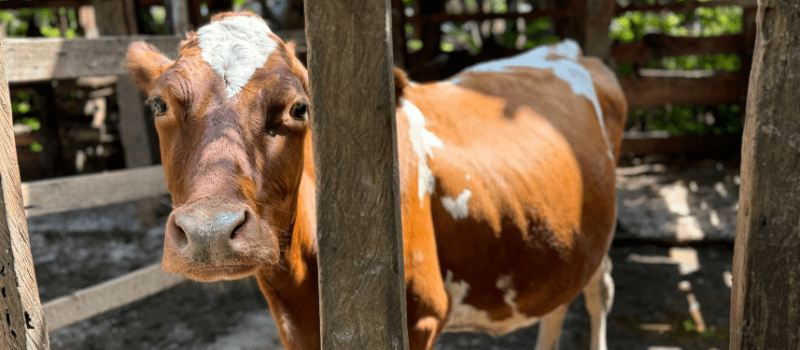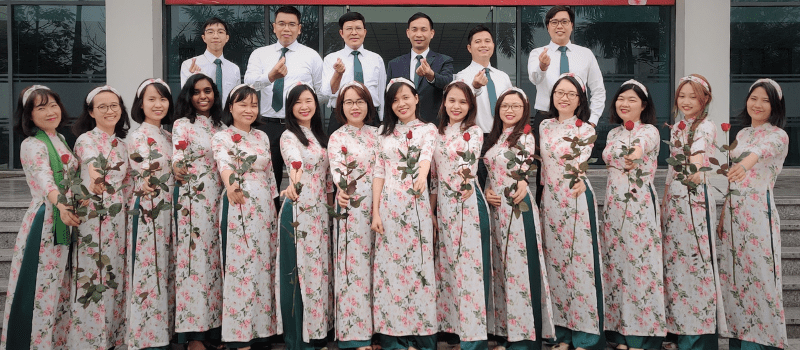This blog was written by Megan Sylka, Senior Program Officer at VWB, reflecting on a trip taken to Kenya in May 2025 to strengthen partnerships and advance implementation of our Volunteers Engaged in Gender-Responsive Technical Solutions (VETS) program.
A Champion in the Making
Recently, I had the pleasure of visiting our partner organizations in Kenya and witnessing firsthand the impact of the VETS program. While in Nyeri County with our partner, Wakulima Dairy, I had the opportunity to visit the farm of Shelmith Mwai—a dairy farmer and Community One Health Champion (COHC) trained through the VETS program.
Since becoming a COHC in 2021, Shelmith has become a standout example of what’s possible when women farmers are supported with the right tools, knowledge, and encouragement. With guidance from Wakulima Dairy and VETS volunteers, she has transformed her farm—boosting milk production, involving her family in daily operations, and mentoring others in her community.
 PHOTO: Shelmith Mwai, a VETS-trained dairy farmer and COHC in Nyeri County, Kenya.
PHOTO: Shelmith Mwai, a VETS-trained dairy farmer and COHC in Nyeri County, Kenya.
 PHOTO: VWB's Megan Sylka (R) with Shelmith and her husband, Peter, at their dairy farm.
PHOTO: VWB's Megan Sylka (R) with Shelmith and her husband, Peter, at their dairy farm.
Shelmith’s journey is one of resilience, innovation, and partnership. She was selected to become a COHC not because she had the largest herd or the best facilities, but because she had something less tangible and far more powerful: passion.
“I have no lactating cows!” she protested at the time. But Rebecca Ndembu, an Extension Officer at Wakulima Dairy, saw her potential—and Shelmith has lived up to every bit of it.
Thanks to the training she received through the COHC program—and ongoing support from VETS volunteers over the years—Shelmith didn’t just apply what she learned. She brought it home. After each session, she would teach her family everything: calf rearing, record keeping, cow hygiene, and even gender dynamics in farming. Her sons now help manage the cows with pride, recognizing the value of shared knowledge and responsibility.
From Setbacks to Strength
Before the VETS program, Shelmith’s farm consisted of a small, traditional shed, and dairy farming was just a way to get by. But the trainings changed that. She rebuilt the shed into a more modern barn and adopted new practices in composting, manure management, and soil health—thanks in part to VETS volunteer Donald Hilborn, an Agricultural Advisor who taught her the importance of keeping manure away from the cowshed and covering it for faster composting. Shelmith applied these lessons quickly, and the results were immediate: fewer flies, happier cows, and thriving crops. Today, her farm produces enough fodder that she no longer needs to buy any.
Shelmith now has two healthy cows, one of which produces an impressive 24–25 litres of milk per day. She’s hopeful the second will soon be pregnant. But more important than the numbers is the transformation this journey has brought to her life. Where she once laboured for others, she now works for herself. She is an employer, a mentor, and a provider.
Her path hasn’t been without setbacks. In recent years, she lost two cows to pneumonia—a painful blow for any small-scale farmer. But thanks to the improvements she had made on her farm and the high yield from her remaining cow, her family stayed afloat. The experience deepened her commitment to prevention, resilience, and continued growth.
Shifting Power, Sharing Knowledge
One of the most inspiring parts of Shelmith’s story is the evolving partnership between her and her husband, Peter. When she first committed to dairy farming, he was skeptical. A businessman by trade, Peter once owned a cow that produced just five litres of milk a day and didn’t believe dairy could be a viable livelihood. But Shelmith’s persistence—and the changes he saw on the farm—won him over.
Today, Peter is fully on board. He supports her participation in trainings, encourages their sons to help out, and even designed a silage system that’s safer and more accessible for Shelmith. They now make decisions together, have a joint bank account, and are planning for the future—starting with installing biogas to make cooking more efficient and environmentally friendly.
Shelmith’s impact doesn’t stop at her farm gate. As a COHC, she now trains five neighbouring farmers—mostly women—encouraging them to turn dairy farming into a family affair. She shares not just technical skills, but also a mindset: with knowledge and collaboration, women can build thriving farms and stronger communities.
Ripples of Empowerment
“It’s like the proverb,” she told me, smiling. “Give a man a fish, he will eat for a day. Teach a man to fish, he will eat for a lifetime.”
Her story is a powerful reminder that the impact of the VETS program isn’t just in training materials or volunteer visits. It’s in the ripple effects. One woman empowered can inspire a family. One family transformed can shift a community.
As I left Shelmith’s farm, I was reminded why this work matters. The VETS program equips farmers with knowledge and support—but it’s people like Shelmith who turn that into lasting change. Her commitment, her adaptability, and the way she brings others along with her—that’s where the real impact happens.
VETS is an 8-year initiative (2020-2028) to improve the economic and social well-being of marginalized people, particularly women and girls, in 6 countries across Africa and Asia. In collaboration with local partners, the program is implemented through 190 Canadian volunteers on international assignment and is generously funded by Global Affairs Canada. Learn more.





